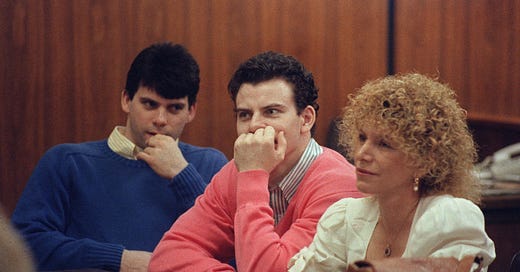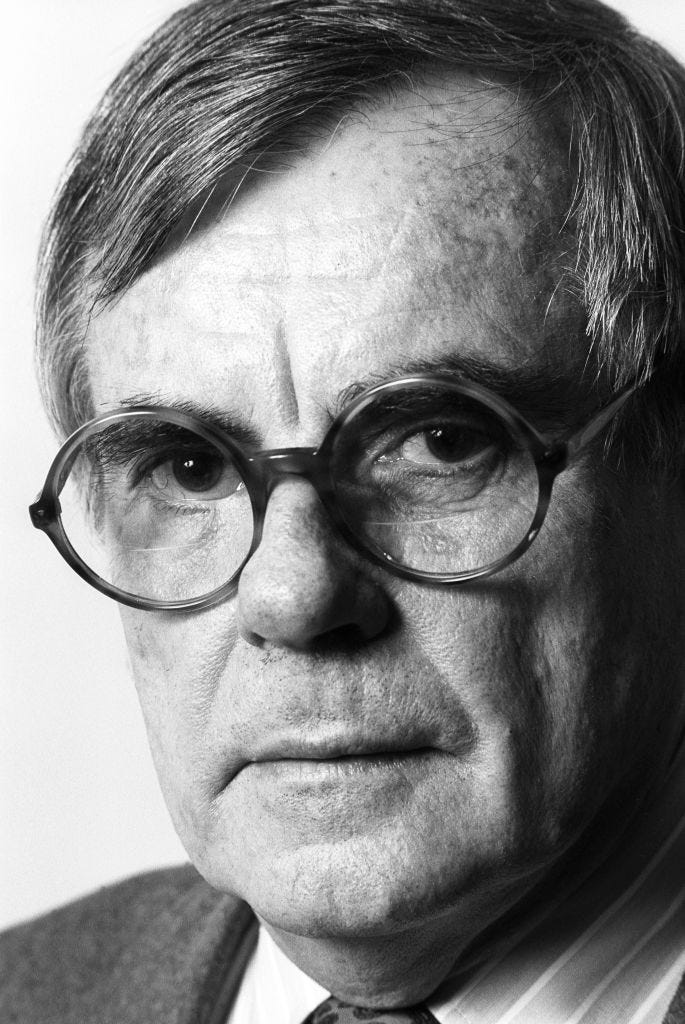The Menendez Brothers Sprung?
Through the prism of a post-Oprah world, would Dominick Dunne have had a more charitable view of the Menendez brothers?
Wow, the LA County DA came through. The Menendez brothers may soon taste their freedom. This is when I miss my dear old friend and colleague Dominick Dunne who wrote some of his best pieces ever on the story for Vanity Fair in the 90s.
I launched Dunne on his journalistic career when I was seated next to him one night at a dinner in 1983 in his old movie producer days. He told me he was on his way to LA to attend the trial of his daughter’s murderer John Sweeney, her possessive, brutal ex-boyfriend who worked as a chef at the fashionable Ma Maison restaurant and who strangled her in 1982. I suggested Dunne keep a diary and, if it resonated, I would publish it in Vanity Fair. He did and it was the first of many riveting reportages of celebrity crime and high/low mayhem for the magazine that made Dunne a household name himself. (In Ryan Murphy's Netflix opus about the Menendez brothers, Dunne is uncannily captured by Nathan Lane.)
Inevitably, the tragedy of his daughter’s murder made Nick a journalist uniquely positioned to see the victims’ point of view and he was as appalled and unsympathetic as one might expect by the horror inflicted on José and Kitty Menendez that night in Beverly Hills. “Two juries took the word of two world-class liars, two rich, spoiled, arrogant losers who were already on the road to a criminal life when they shot their mother's face off and their father's brains out,” Dunne wrote after the first Menendez trial in 1994 ended in two hung juries.
Dunne felt particular disgust for defense attorney Leslie Abramson who represented Erik and was passionate in her presentation of what came to be known as the sexual abuse excuse. Now, more than three decades later, when the full details of the boys’ torment by their father is being reexamined through the prism of a post-Oprah world., would Dunne have had a more charitable view of the two brothers than he did in the 90s? I asked his son, Griffin Dunne, actor and author of the best-selling memoir The Friday Afternoon Club, who told me his father had felt more conflicted at the time than his Vanity Fair pieces reflected. As the trial progressed, Griffin said, and the boys’ abuse was so vividly recounted in their testimony, it triggered memories for Dominick Dunne of his own father’s cruelty that he had never discussed with Griffin before.
“The beatings from my Dad’s father were random and indiscriminate,” Griffin told me. “If Dad expounded enthusiastically about the movie Dark Victory or Bette Davis at the dinner table, a beating was sure to follow. His passion for movie stars struck his father as effeminate who routinely called him a sissy when applying the belt. It was during the trial that Dad first told me about his father’s abuse. Not once, but quite a few times and, by the rage in his voice, he seemed to relive his shame in every telling.”
Griffin says his father might well have been supportive of reconsidering the Menendez sentence today. “He had gone out so much on a limb about their guilt in his pieces. He hated the Beverly Hills privilege, their arrogance of being brought up that way. It was such a different time when abuse and incest were such shameful things, people didn’t go to the police.”
Dominick Dunne did bring himself to reveal his own abuse in his Vanity Fair Menendez coverage. “Lest I be grouped in that contemptible circle of people Abramson calls uneducable on the subject,” he wrote, “those people who cannot and will not understand the gravity of child abuse, I feel reluctantly obliged to reveal my own deep secret on that matter. I was abused as a child, although the term "child abuse" was not in use at the time. I was not abused sexually, but physically and psychologically. I was beaten with straps, hangers, and riding crops. I have had welts on my legs and thighs. To this day I remain partially deaf from a blow to the ear when I was in the fifth grade. I was a sissy. I was not good at sports. I embarrassed my father, a prominent heart surgeon in Hartford, Connecticut, who was otherwise a loved and highly respected figure.” But Dunne claims he never wanted or would have killed his father. He left home and made a different life.
When I found the passage above from that old Vanity Fair piece, I shared it with Griffin who replied, “I wish I had thought to reread this when writing my memoir. My heart breaks for him reading this again.”








What luck for all of us that you were seated next to Mr. Dunne those many years ago. I read his columns ravenously when I was introduced to his work by a neighbor 20+ years ago. VF was the only magazine I subscribed to in college (Bennington ‘08), and I have all of his books. With the Swans & the Menendez shows, Griffin’s book, and your substack… as the kids say: we are SO back.
Has Georgie picked a costume yet?
I remember, with pleasure, DD's refined horror at the Menendez house and its furnishings. But that urbane and occasionally flippant front masked a steely adherence to notions of equity and justice. The patrician bearing, surely, was a defence against the horrors of the world from which he couldn't quite avert his eyes. I can see him conceding the extenuating nature of the abuse, but I can't see him flip-flopping on the question of the brothers' guilt.